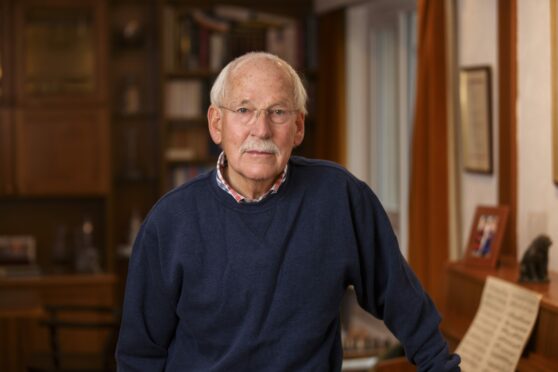
A bill to introduce assisted dying in Scotland will be built to protect the rights of the terminally ill, according to a campaigning doctor.
Professor Sir Graeme Catto, former General Medical Council (GMC) chairman, chief scientist for the NHS in Scotland and a supporter of the proposed legislation, said any law will ensure only patients who are deemed mentally competent to make the decision will be helped to die.
Liberal Democrat Liam McArthur last month won enough support from fellow MSPs for his Assisted Dying for Terminally Ill Adults (Scotland) Bill and the proposed legislation is set to be introduced at Hollyrood next year.
It is expected to include safeguards, such as requirements for two doctors to confirm the person is terminally ill and proof the person has the mental capacity to make the decision and that there is no coercion. A 14-day reflection period may also be included.
Catto, patron of Dignity In Dying Scotland, an organisation that promotes assisted dying for terminal patients, said: “That final act must be taken by the patient themselves.
“I personally do not believe in a right to die but I do believe that the dying should have the right to die with dignity at a time and place of their choosing if that is their settled wish. This is not to support suicide. Those seeking an assisted death do not wish to die but are dying anyway. If the bill does not pass, no lives will be saved but needless suffering will continue, needless suffering that the best palliative care cannot control.
“If the patient is physically disabled but still able to make their wishes clear, they will manage to operate a syringe pump or computer.
“Patients lacking mental capacity will, however, not be helped by this legislation, even if they had wished an assisted death when they were mentally well.”
Opponents of the proposed legislation have suggested it would undermine the rights of disabled people and those with mental health conditions. Other concerns include fears that vulnerable patients might be encouraged to believe they are a burden to their families.
Assisted dying laws in Belgium were investigated by the European Court of Human Rights after a complaint from the son of a depressed woman who was helped to die in 2012. He said he wasn’t properly informed of the decision to go ahead with the procedure and only learned it had happened the day after it was carried out.
However, earlier this month judges ruled in favour of the Belgian state in three out of four counts, only finding fault over how the government conducted a review after the euthanasia was performed.
Catto, 77, who speaks as both a doctor and a patient after being diagnosed with prostate cancer, said the laws being proposed in Scotland would not have allowed the Belgian situation to arise.
He said: “I firmly believe people should have the opportunity to end their lives if living becomes unbearable because of illness and I hope to be able to make that decision myself if and when the time comes.
“The bill will state that mentally competent, terminally ill adults will be able to seek an assisted death if that is their settled wish. The Belgian patient had a long-standing depressive illness and simply would not be eligible for an assisted death here. Chronic mental illness will not be deemed a terminal illness.”
The professor’s personal view on assisted dying was formed years ago when he watched his mother, Dora, die from a brain tumour at 62.
He asked doctors not to give active treatment to his father, William, when he was ill in hospital at the age of 93.
“When the doctor called to say my father was seriously ill, I told him, ‘No antibiotics or drip, only a catheter. It’s what my father would have wanted,’” he recalled.
He added that his father’s death was peaceful, in contrast to his mother’s passing. She died nine months after her cancer diagnosis.
Catto has been living with his cancer since it was diagnosed in 2003. He chose to undergo surgery to remove the entire prostate gland. The operation contained the cancer but Catto acknowledges that it will eventually return.
He said: “I am living with prostate cancer that is contained and mindful that it could come back. It will.”
Catto began his career as a junior doctor at Aberdeen Royal Infirmary before studying medicine at Harvard Medical School in the US, where he established his interest in kidney transplants and immunology.
He chaired the GMC when it had to deal with the consequences of the Dr Harold Shipman inquiry. GP Shipman, who died in 2004 while serving a life sentence at Wakefield prison, is believed to have been one of the most prolific serial killers in modern history, with an estimated 250 patient victims.
Catto said: “Ensuring that we are all able to make informed decisions on our treatment is the best way of improving patient safety. Dr Shipman used the cloak of secrecy to murder so many of his patients.”
Holyrood bid to change the law
The MSP looking to change the law to allow assisted dying in Scotland has won the right to introduce his Members’ Bill in the Scottish Parliament.
Liam McArthur, a Scottish Liberal Democrat, won the support of 36 MSPs, double the amount needed to introduce the legislation.
The Orkney Islands MSP will now draft a bill with the intention of introducing it early next year. He said: “The support among colleagues has been deeply heartening, and demonstrates the growing recognition that there is a need to end the ban on assisted dying in Scotland.”
A public consultation on assisted dying received more than 14,000 responses, with three-quarters of respondents backing new legislation.
McArthur said: “The public consultation on these proposals, published last month, demonstrated there is strong and passionate support for offering people more choice at the end of their life.
“I now look forward to working with colleagues in Parliament to bring forward a safe, robust and compassionate bill.
“I remain committed to a process that carefully considers the views of the public, organisations and healthcare professionals, as well as international experience, to craft legislation that is tightly drawn and contains strong safeguards.”
MSP Margo MacDonald, who had Parkinson’s disease, tried unsuccessfully to change the law on assisted dying in Scotland in 2010.
After her death in 2014, Green MSP Patrick Harvie led the campaign for legislative change but an assisted dying bill was defeated by 82 votes to 36.

Enjoy the convenience of having The Sunday Post delivered as a digital ePaper straight to your smartphone, tablet or computer.
Subscribe for only £5.49 a month and enjoy all the benefits of the printed paper as a digital replica.
Subscribe © PA
© PA